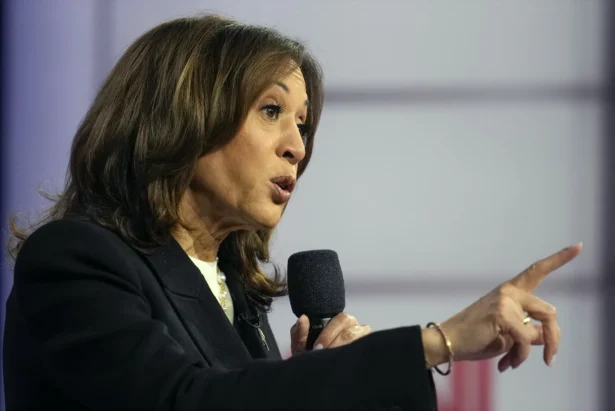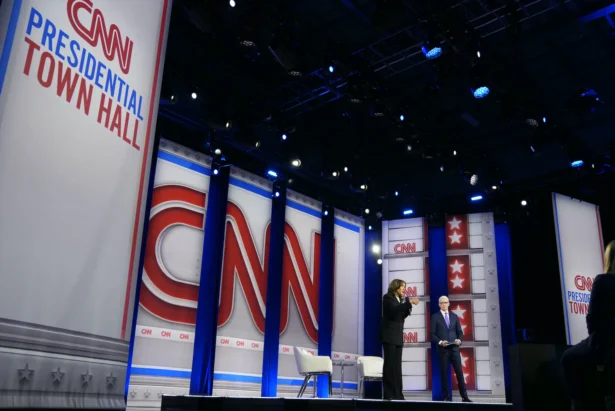Vice President Kamala Harris answered questions from undecided voters in the swing state of Pennsylvania during a CNN town hall on Wednesday evening.
The Keystone State, which holds 19 electoral votes, is crucial to winning the 2024 presidential race.
CNN host Anderson Cooper served as moderator of the event in Delaware County. Cooper informed viewers that the audience members were all registered voters who remain “undecided” and “persuadable” in the 2024 race. They included Democrats, Republicans, and independents, who all confirmed that they intended to vote in November.
Questions were drafted by the audience members themselves, according to Cooper. The network did not edit the questions or offer any help in shaping them, he stated before the town hall began.
The audience members were chosen from a pool of people identified by a nonpartisan research organization and editorial producers, Cooper said.
The contest in Pennsylvania remains competitive, according to the latest data by poll tracking firm FiveThirtyEight. Former President Donald Trump has a narrow lead over Harris 47.8 percent to 47.6 percent, which is within the margin of error.
Trump was invited to the town hall, according to CNN, but declined to participate. He instead held two events in Georgia, which is also a battleground state.

Here are some key takeaways from the town hall:
Harris Targets Trump
Cooper gave Harris an opportunity to make a pitch to undecided voters with less than two weeks until Election Day.
Harris stated that Trump is “increasingly unstable and unfit to serve.”
Four-star Marine general John Kelly, who was once also White House chief of staff during the Trump administration, said Trump is dangerous, she said. The vice president was referring to Kelly’s interview with The Atlantic that claimed that Trump, as president, praised the loyalty of Adolf Hitler’s generals.
“Do you think Donald Trump is a fascist?” Cooper asked her.
“Yes, I do. Yes, I do,” Harris answered.
Meanwhile, Robert F. Kennedy Jr., earlier on Wednesday at a rally in Georgia, accused Kelly of taking Trump’s words out of context.
The Trump campaign also refuted Kelly’s claims.
Back-and-Forth on the Border
Cooper pressed Harris on illegal immigration and asked about her plans to move forward with a compromise bill that included $650 million for the southern border wall earmarked under Trump, even though she once referred to it as Trump’s “medieval vanity project.”
“Is the border wall stupid?” Cooper asked Harris.
“I think what [Trump] did and how he did it didn’t make much sense because he didn’t do much of anything,” Harris said, further adding that Trump promised Mexico would pay for the wall, but that never happened.
She then pivoted to her plan to introduce a comprehensive bill that addresses illegal immigration in the long term, reiterating that people have to “earn” United States citizenship.
“But do you want to build some wall?” Cooper pressed.
“I want to strengthen our border,” Harris answered.
Illegal immigration is a top issue among voters in the 2024 election. Trump, on the other hand, has vowed to carry out the largest deportation in history and has long taken a tough stance on illegal immigration.

Clarity on Policies
Harris was asked to discuss one major policy goal that she would like to accomplish that would require Congressional approval.
The Democratic presidential nominee declined to specify and said that there were too many to name.
“Well, there’s not just one, I have to be honest with you,” she said. “There is a lot of work that needs to happen.”
Harris then went on to talk about how Washington has become too partisan for a president to accomplish such major policy initiatives and how the divide slows down the process. Instead, Harris said, lawmakers should work across the aisle and listed President Joe Biden’s achievements that were reached through bipartisan agreement such as using infrastructure and gun control as examples.
“We’ve got to get past this era of politics and partisan politics,” Harris stated.
She later discussed the importance of reforming the Supreme Court, reiterated that she would not ban fracking as president and would continue to allow Medicare to negotiate with big pharmaceutical companies to bring down the cost of prescription drug prices.
Distancing Herself From Biden
The vice president has often been pressed on the campaign trail about what she would do differently than Biden.
Harris pledged that her presidency would not be a continuation of the Biden administration.
“I bring a whole set of different experiences to this job,” she said, further explaining that she represents a whole “new generation of leadership.”
She then listed several major policy plans, such as having Medicare cover home health care for the elderly.
But Cooper continued to press Harris and questioned why she hadn’t executed those plans during her time as vice president.
Harris explained that a lot was accomplished during the Biden administration but that there’s still much more to do.
In the final question of the night, Harris was asked to identify the proudest moment in her political career. She did not point to any accomplishments as vice president, but rather highlighted her time as Attorney General of California when she established the Bureau of Children’s Justice. The bureau addresses systemic issues that impact California’s youth, according to its website.
